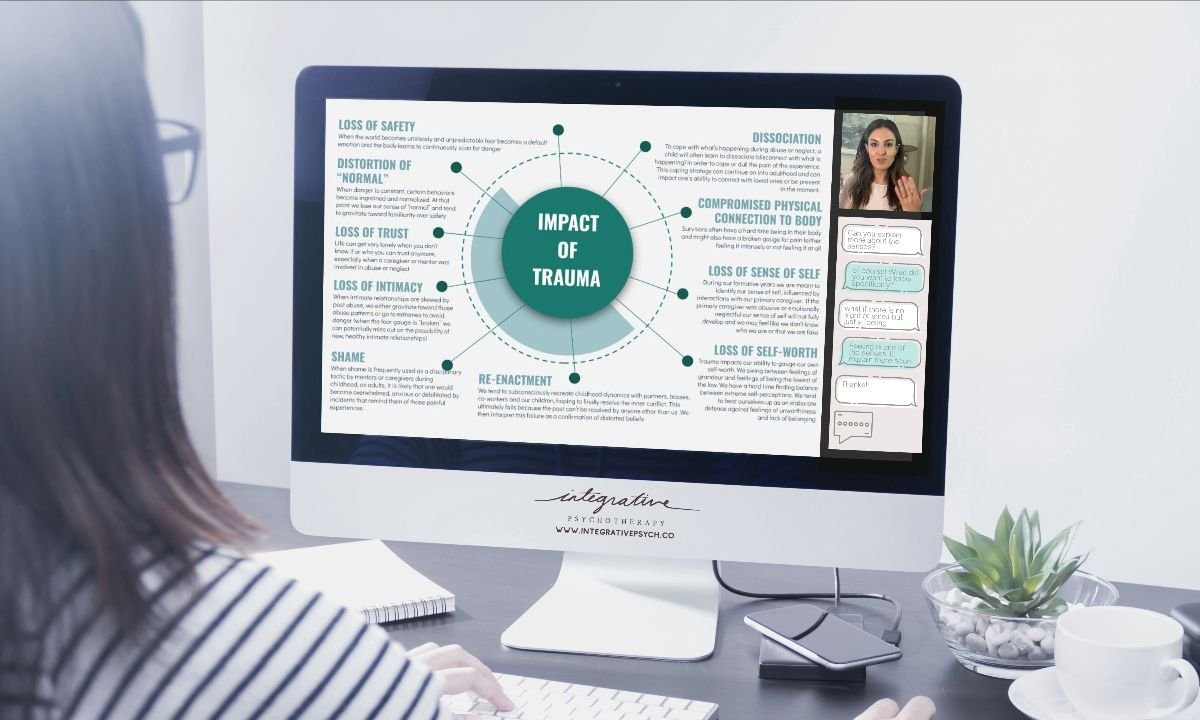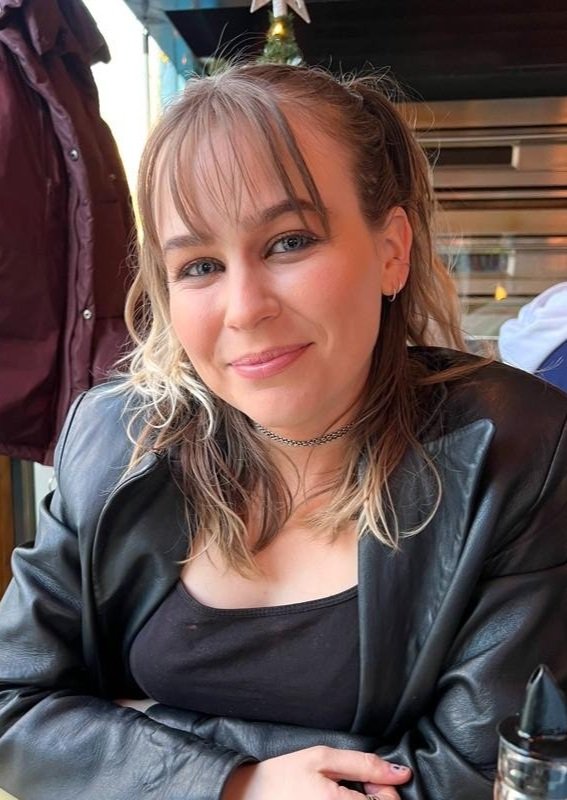
Integrative Trauma
Therapist Certification
The world needs more skilled trauma therapists…
Are you ready to step up?
Become a certified trauma specialist with our essential 6 month Intensive Trauma Training.
38 CEUS
You are a therapist who wants more.
You've come to this field because you want to make a difference in the world, but you feel like you have hit the glass ceiling in your knowledge, and your skillset. Something is missing.
Your clients have been sticking around because they are holding onto hope, but you’re not feeling confident enough to support them through their pain. You want the tools to be able to carry them through to a place of inner resonance & healing. You want to rediscover your passion for trauma work while also feeling confident and clear about how you can help.
It’s time to step up...learn new skills, build your confidence and deepen your identity as a trauma therapist.
Integrative Trauma Therapist Certification That Transforms
As a trauma expert, I have trained and supervised clinicians for close to 15 years to empower them with skills and tools that skyrocket clinical outcomes. At the heart of what I teach is humility, clinical skill and the ability to bring the human to human connection to every session. In a sea of trauma trainings, my training provides a combination of advanced therapy skills blending EMDR, IFS, Somatic and Creative Methods to Trauma Therapy.
That’s why I created the Integrative Trauma Therapy Training & Certificate Program, to provide you with a deeper understanding of trauma, clarity on ways to provide trauma treatment, advanced interventions, and an overall feeling of confidence and clarity that you’ll bring to your work.
The wisdom and skills acquired in this training will help you maximize each and every session with your clients. As your clinical outcomes improve and soar, you will get more ideal clients referred to you.
You’ll feel more confident about when to dive deeper, when to refer out, when to get consultation, and know exactly what to do to get to the next level with your clients.

Integrative Trauma Therapist Course Details & Certifications
Certificate of Completion in Integrative Trauma Treatment + 38 CEUS
This Intensive Trauma training will assist you in improving your clinical outcomes by giving you the opportunities to:
Show up to sessions with patience, flexibility and confidence in your practice.
Become skilled in setting attainable treatment plans and goals.
Discover the Three Primary Trauma Types and How To Treat Them
Utilize Interventions for Each Phase Of Trauma Healing (using somatic, parts work, cognitive work and creative methods.)
-

Module 1
Trauma is not for the faint of heart. Commit to your why so you can have the focus and energy you need to show up day-to-day.
OUTCOMES:
● Get to the core thread of your clients’s pain points so you can provide relief
● Set you and your clients up for success from the very first session
● Identifying how trauma shows up differently in each client
● Manage your energy in the therapy room
● Identify your WHY: What makes you passionate about this work?
-

Module 2
Have a clear treatment focus and skills to provide relief.
OUTCOMES:
● Structure treatment to help the client experience immediate relief
● Identify which trauma diagnosis your client has
● Instill hope by providing psychoeducation and a roadmap to their personal healing
● Get the scientific research on the 3 different types of trauma diagnosis
-

Module 3
It’s never “IF” you hit roadblocks, it's “WHEN” you hit roadblocks. Confidently plan for navigating complexities that come up in treatment.
OUTCOMES:
● Recognizing when dissociation enters the therapy room
● Interrupt toxic shame cycles
● Move from complicated grief to processing grief
● Practice relational interventions for clients with attachment wounds
● Confidently challenge blockages and defenses that come up in therapy
-

Module 4
Understanding Trauma Reaction and Survival Strategies and how they show up in our clients' lives.
OUTCOMES:
● Teach your clients how to link trauma to their coping mechanisms.
● Identify explicit and implicit triggers
● Develop your sixth sense as a therapist
● Be an expert in neurotransmission, neuroplasticity, and somatic memory to educate your clients
● Tools to regulate the Limbic Nervous System in every session
● Remove pathology from cognitive, behavioral, emotional, and existential coping responses.
● Know when you are colliding or colluding with your clients and how to recommit to the treatment structure
-

Module 5
Assessments are more than handing a questionnaire to your clients. In this module, I give you the nuances you need to assess your clients' struggles properly.
OUTCOMES:
● Become an expert diagnostician identifying pressing concerns
● Assess clients' needs to improve their level of functioning
● Assess clients' readiness and capacity to engage in deeper trauma processing
● Use instructions and best practices for over 20 assessment types (including mood, attachment, trauma, somatic, dissociation, OCD, and more)
● Learn how to use the DES and MID for clients with dissociation
● Determine which assessments should be administered via hard copy, verbally, or other creative means.
-

Module 6
Bring your clients to the finish line. You want your clients to be successful but what does success mean?
OUTCOMES:
● Skillfully navigate rupture and repair
● Set, track and reach clear treatment goals
● Use effective scripts to initiate meaningful feedback conversations
● Keep yourself in check. Is transference and/or
countertransference showing up?
● Avoid flooding or stagnation by properly pacing the treatment plan
● Know when and how to refer out
Apply to complete your Integrative Trauma Therapist certificate today!
Here’s what you get when you join our Trauma Therapist Training Certification + Community
Live Consultations
Supervision in the comfort of your home.
This is an interactive training and consultation group that consists of 6 Months of 90 minutes BI-WEEKLY face-to-face sessions (12 total) with Trauma Specialist, Esther Goldstein.
You will also get to present your cases and get clinical input and guidance so you deepen your impact and provide more aligned clinical work.
Trauma Resource Library
Answers to your hottest questions at your fingertips.
You will have access to instructional videos, tools, templates, downloads and exercises created based on the data I’ve researched and collected through my decade of practice and consultations.
These trainings are available to you at anytime. They are comprehensive, thorough and based in research and science. You may want to re-watch them throughout your learning.
Access to Esther
Laser focused support to break open your heart and unleash your skills.
Each participant will meet with Esther one time throughout the course. This is an opportunity for me to support you in your clinical journey, gain confidence in your professional identity and become the known trauma expert in your community.
In addition to this call, I am responsive to emails and messages sent through the online community.
Community
Finding your people and healing the world together.
Join an exclusive cohort of professionals committed to advancing their expertise. The online community is a place for you to meet and communicate with other leaders and trauma professionals.
Each participant is encouraged to support one another by sharing resources, celebrating wins and navigating struggles. This community is worldwide and an incredible value to trauma therapists looking to advance their clinical expertise and improve their clinical outcomes .
LEARNING FORMAT
We have the perfect blend. Learning together when you need it, and going at your own pace, when you don’t.
Synchronous | Coming together for face-to-face learning.
This is an interactive training and consultation group that consists of 6 Months of 90 minutes BI-WEEKLY face-to-face sessions (12 total) with Trauma Specialist, Esther Goldstein. This time is for you and your cohort to ask questions, real-time implementation and clarification. Consultation is imperative so you can personalize the knowledge and can use your newfound skills and wisdom with ease in your next session. You will also get to present your cases and get clinical input and guidance so you deepen your impact and provide more aligned clinical work.
Time investment for LIVE Consultation:
We meet every other week, for 90 minutes, to dive into your clinical questions, to clarify concepts, and to practice interventions and skills, in realtime.
Asynchronous | Learning on your own schedule, at your speed.
Signing up for this training will give you full access to our online platform where you get to dive into ONE module each week where you will get strategies to help you maximize your skills in the therapy room. You will have access instructional videos, tools, templates and downloads for you to use in your practice immediately. These trainings are ones you can listen to at anytime and are so rich, you may want to re-watch them throughout your learning.
Time Investment for Online Course:
Plan to Spend one hour a week: half an hour on reading the week’s booklet and half an hour on watching the weekly videos

Interventions, skills and adapting to your style - a trauma training that works for YOU!
When you’re sitting across of a client who feels frightened, who is out of their window of tolerance, or is needing a shift before they leave your therapy room, you need to provide something tangible. Interventions and tools are vital in this work. Often, clients walks in holding a lot, and though we don’t offer a one-time-cure, we can guide them to an exercise, or engage them in an activity so that they feel met and understood. Using a skillful intervention allows for transformation to take place.
At the end of every module we have a downloadable worksheet for you!
You will get practice using each of the worksheets in the training, so that you get a feel for how to use it effectively. The interventions were made with you and your client in mind. They are meant to be printable so that you can use them in your very next session!
Replicable Interventions include:
Working with the Inner Child
Somatic Processing Skills
Attachment Informed Interventions
Cognitive and Dialectical Interventions
Window of Tolerance
Body Scan
Parts Mapping (parts work) We have a really creative art activity to go along with this one!
Guided Meditation
Grounding Exercises
Boundary Setting
Distancing Techniques
Resource/Strengths Building
Meet your trainer, Esther Goldstein.
Hi, I’m Esther Goldstein, and I’m super passionate about helping clinicians harness their trauma informed skills.
I want you to not only help clients heal, but for you to also have a deep knowing that your skills are adequate to help the client sitting across you.
In my many years of advanced training and in my continued quest for understanding how trauma healing works, I’ve acquire
d a thorough, robust skillset that has helped me help many clients heal.
In this training, I won’t just teach you the basics, but I’ll share my knowledge from my advanced trainings, and share some powerful learning experiences from my years of practice - including missteps and success stories!
For more about my trainings, and my approach, click here.
I look forward to training and growing with you!
- Esther
It’s Time To Apply
Our Trauma Training is now open for applications!
How Do You Apply? Click on the “Book a FREE Discovery Call” button on this page. Once you submit your application, and we see that you are a good fit, you’ll receive an email with a link to meet Esther for a 30 min consult to ensure this training is perfect for what you’re needing! If we are a good fit, you’ll get a follow up email to process payment and earn access to our training!
WHEN: Open Enrollment [until slots fill].
6 Months of LIVE Training & Consultation
You get to set the time! It is suggested you set 1-2 hours per week to watch the videos and engage in the activities, self reflection, digest the skills and knowledge and write your questions for the Q&A zoom call!
ZOOM CALLS: The zoom calls with take place bi-weekly (twice a month) for 6 months. We meet @12pm-1:30pm EST on the first and third Tuesday of the month- starting the first week of the trauma training.

It’s Time To Apply!
You can learn a lot about trauma interventions, but knowledge is more powerful when applied to your clinical work.
Implementation is what the consultation time is all about!

Your Trauma Training Library
Our Trauma Training Library is loaded with advanced therapy interventions such as working with shame, working past blockages, working with complex dissociation, promoting earned secure attachment, explaining family roles & schemas & more.
You are making an important decision about choosing to sign up for this trauma Course & Consultation.
These Q&As can help you decide if this course can be helpful to you and what you are hoping to gain.
Frequently Asked Questions
Say buh-bye to second guessing and hello to confidence.
Who is this training for?
This training is for mental health professionals who work with people, one on one, in a group setting or in any other therapeutic role. Psychiatrists, Psychologists, Psychiatric Nurse Practitioners (working clinically), Social Workers, Marriage and Family Therapists, Art Therapists...
This is right for you if you are:
Looking to expand your professional skill set in treating clients with simple to multifaceted trauma.
Wanting to identify and implement clear boundaries that support the client- therapist relationship.
Unsure how to keep therapeutic treatment on track when a client is facing a blockage
Feeling insecure in your work and wondering if your clients are experiencing adequate relief.
Need accountability and community in order to grow into your role as a trauma specialist.
+ What will I get out of this course?
You will get a deep understanding of how to work with trauma, how to pick up on the nuances of trauma in your clients (the ones who present with it and are conscious of it, and those who are not), and be able to provide better clinical care. Good therapy is not only about intervention, it is also about assessments and attunment of the therapist who knows how to identify the primary treatment needs of the client. This training will help you develop a Trauma Informed Lens so that you create a treatment plan that allows for more efficient and effective therapy.
You will also learn interventions including mind-body somatic interventions, cognitive interventions, "parts work" as well as expressive arts and attachment informed interventions. Each module has exercises and handouts for you to use as psychoeducation as well as tools and ideas to use in your very next session!
+ If I take the course, can I stay on, beyond the 6 months, for the Alumni Consultation Group?
Yes, you can. We have an Alumni offering of Bi-Weekly LIVE Consultations that is available only for Cohort graduates.
+ CEUS - Are you approved to give CEUS?
Yes we are! Esther Goldstein and Integrative Psychotherapy LCSW, PLLC is recognized by the New York State Education Department's State Board for Social Work as an approved provider for continuing education for licensed social workers #SW-0754.
+ How long is each training ?
This Trauma Therapist Training and Consultation is a commitment to a 6 month training. You can watch the trauma course online, in a self-paced way, and digest the knowledge over time. As well, you join the twice a month 90 minute consultation meetings where we provide personalized consultation and support to the clinical complexities you're wanting support and guidance on.
+ How are you tracking our learning experience?
I'm so glad you asked! At the beginning of the course, we have you fill out a self assessment so we get a real sense of where you're at, what you're hoping to gain and what you're already really skilled at. We re-administer the assessment at the end of the course to track your growth, and what you gained in this course.
We want to help you notice your own growth as you expand your confidence, wisdom and skills. We also want you to be able to notice the smaller, yet equally significant, gains of deepening the knowledge you may have already known, while solidifying your clinical voice. We are open to feedback and input as we want to be sure you are getting exactly what you need from this course. For some of you, some of this will be a deepening of what you know, while gaining new skills, and for others, this will all be new and you'll digest it at a pace that's right for you.
+ How long will I have access to the information for?
How does a lifetime sound to you? Yes, you can review the information as long as you want, and get to enjoy the upgrades as we tweak and evolve, with each cohort.
+What happens if I miss a week?
If you miss a week, you can carve out time the following week to catch up on the recordings! And be sure to review the recorded Zoom calls so you learn the information! Remember, the downloads and PDFs are downloadable and save-able so you'll have that content for forever.
+ Do you offer payment plans?
Yes, we have price points to meet each of your budgets. Ask us about our payment plans on your application.
+ Do you offer a Certificate of Completion with the CEUS?
Yes, you do receive a certificate of completion in Integrative Trauma Treatment Training (with CEUS) after completing this training!
+ What is your favorite part of running this course?
There are a few! One, seeing the lightbulb go off in therapists minds as they get clarity on previously murky concepts! It's invigorating to see the clarity and how newfound wisdom can truly shift the clinical focus, and improves client results. As well, what I love is...getting to know how many thirsty and passionate therapists are out there, committed to growing, blossoming and evolving as humans..it's inspiring! And, seeing the devotion of soulful therapists who know how their investment outside of session really allows for significant shifts. This is all humbling to see.
WELCOME TO THE TRAUMA TRIBE. WE ARE DELIGHTED TO HAVE YOU ABOARD!

Endorsements from Fellow Trauma Experts
Kind words from close colleagues



























